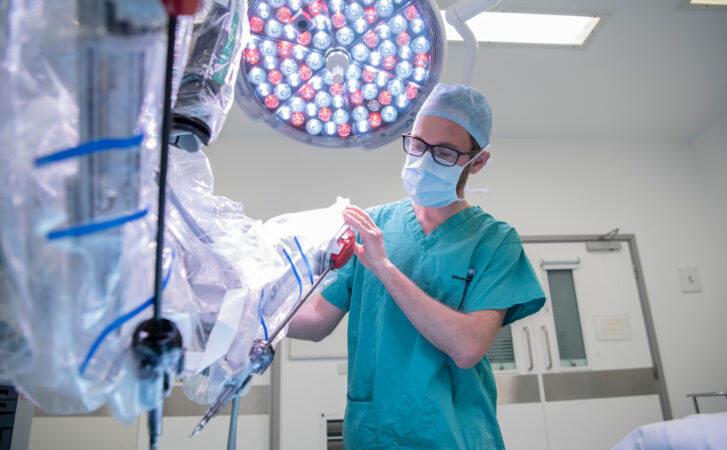Uncategorised
26 October 2021

Mr Simon Harper, Consultant Hepatobiliary and Transplant Surgeon announces that ACT has reached its £250,000 milestone to buy a surgical robot for Addenbrooke’s
28 October 2021
A £1.5 million appeal run by Addenbrooke’s Charitable Trust (ACT) to buy a surgical robot for Addenbrooke’s Hospital has passed the £250,000 milestone for donations and funds raised, following its launch earlier this year.
The fundraising campaign to buy the new surgical robot – that will mean quicker, less invasive surgery and faster healing and recovery times for patients – has inspired dozens of fundraisers to support in a unique fashion.
Many have taken part in the 1000 Challenge – asking if people can complete an activity a thousand times to raise £1,000 – along with a variety of other efforts to help the NHS including:
- Running the London Marathon on 3 October
- Learning Welsh for 1000 minutes
- Learning mandolin for 1000 minutes
- Penalty kick challenges
- The Grantchester charity run
- Toy sales
- Doing the Three Peaks Challenge
- Walking for a thousand minutes (16 hours 40 minutes)
- Organising a tractor run in support of the campaign
- Walking up a flight of stairs ten times a day for 100 days.
ACT is now gearing up the next phase of its Robot Appeal and is asking the public to take part in some fundraising activity over the next few months to help the NHS at a critical time.
The charity is calling on its supporters and the public to come up with their suggestions to help raise funds or take part in the 1000 Challenge, or to donate, to help reach the £1.5 million target as quickly as possible.
Helping post-pandemic NHS recovery
Shelly Thake, Addenbrooke’s Charitable Trust’s (ACT) CEO, said: “We want to say a massive thank you to all those who have supported our appeal so far. It has been a magnificent response that shows how the public want to help the NHS at this critical time.
“We hope we can once again call upon those who support the NHS and Addenbrooke’s to help us reach our Robot Appeal target. With the pressures caused by the pandemic, the hospital needs our help to get its surgical programme moving again and to deliver the quickest, safest surgery possible.
“Following the pandemic, people now more clearly grasp that hospital charities have a big impact in supporting innovation and research and staff wellbeing measures.
“The past 18 months has shown that the public want to help the NHS in the best way possible and by working with charities like ACT, they know that their efforts are delivering above and beyond what can be currently done. People are inspired by the NHS and the care they have received and want to give back where they can.”
About robotic surgery
The robot will enable surgeons and their teams to operate on more patients, from people with pancreatic cancer to gynaecology patients, enabling them to recuperate faster and get home to their families more quickly.
Robotic surgery is a form of keyhole surgery involving small incisions where the surgeon operates on the patient by controlling a computer-enhanced robot, mimicking the surgeon’s hands and wrist movements, and allowing absolute precision.
The large 3D view of the patient’s organs enables surgeons to perform many types of complex procedures with enhanced vision, greater precision, flexibility, and control than is possible with conventional techniques.
The benefits of robotic surgery for patients are immense and can change patients’ lives. It can take months to recover from traditional, ‘open’ surgery but incisions made using robotic surgery are much smaller, reducing the risk of complications and infection, minimising scarring, pain, and discomfort and helping patients recover and return home more quickly. Following robot-assisted surgery, patients can be discharged from hospital within a matter of days, not weeks.
However, Addenbrooke’s currently only has one robot which is dedicated to kidney, bladder, and prostate cancer patients. ACT’s new appeal will help fund another surgical robot, that could revolutionise patient care across six specialities in the hospital including urology, gynae-oncology, gynaecology, lower GI (gastrointestinal tract), ENT (ear, nose, and throat) and HPB (Hepato-Pancreatico-Biliary – diseases of the liver, pancreas and biliary tree) and improving outcomes for many more patients every year.
One specialty area that could benefit is head and neck surgery, which can be very invasive and where some tumours are difficult to reach. This can lead to scarring that can be very distressing for patients. A surgical robot can access the tumour through the mouth with precision meaning that patients regain the ability to swallow much more quickly, can eat and drink without help, and need less ongoing treatment. ACT’s campaign to buy a surgical robot could help ENT patients get back on their feet much sooner after an operation.
To find out more please visit www.helpyourhospital.co.uk/robot
Return to news
